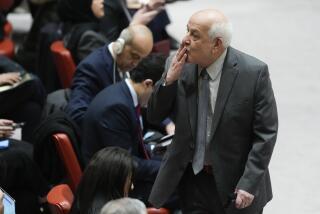U.N. Council Again Condemns Serbs’ ‘Ethnic Cleansing’ : Diplomacy: Group meets in emergency session as humanitarian condition worsens. Stricter sanctions may be forthcoming.
UNITED NATIONS — With the Bosnian Serbs reiterating their rejection of an international peace plan, the U.N. Security Council met in emergency session Saturday and condemned the Serbs once again for their “unlawful, unacceptable and abhorrent policy of ethnic cleansing.”
In a statement, the 15 ambassadors of the council said they were “shocked by and extremely alarmed at the dire and worsening” humanitarian situation in eastern Bosnia.
The Security Council appeared ready to retaliate this week by imposing new and tighter sanctions on Serbia in the wake of the latest refusal to accept a plan to end the conflict.
Meeting in the Bosnian town of Bileca in territory under their control, the self-proclaimed Bosnian Serb Parliament voted 68-0, with one abstention, to reject the peace plan fashioned by former U.S. Secretary of State Cyrus R. Vance and former British Foreign Secretary Lord Owen. The plan has been accepted by the Bosnian Muslims and the Bosnian Croats, the two other parties in the civil war that is ravaging Bosnia-Herzegovina.
As news of the defiance and a deterioration of the U.N. relief operation in eastern Bosnia reached New York, the Security Council met in emergency session.
The council’s president, Ambassador Jamsheed Marker of Pakistan, called the meeting after Sadako Ogata, the U.N. high commissioner for refugees, reported that, despite a truce in eastern Bosnia, the Serbs had resumed their harassment and blocking of relief convoys trying to reach the besieged Muslim town of Srebrenica.
“As time is running out, more drastic action needs to be taken urgently to ensure the survival of the population of Srebrenica,” Ogata said in a letter to the Security Council.
As the ambassadors gathered for their session on Srebrenica, they were clearly upset by the latest and most blatant act of defiance from the Bosnian Serbs on the Vance-Owen peace plan.
A draft resolution on the tightening of sanctions is before the Security Council. But the ambassadors, meeting in closed session Friday, decided to put off a vote on it until this week. The delay was requested by the Russian government, which is facing a backlash at home for supporting tough measures against the Serbs, traditional Slavic allies of the Russians.
The resolution would give the Bosnian Serbs 15 days to sign the Vance-Owen peace agreement. If that deadline is not met, sanctions would automatically tighten against Serbia and its allied republic of Montenegro.
The defiant vote in Bileca would seem to end hopes that the Bosnian Serbs will change their minds in 15 days. But Secretary of State Warren Christopher, speaking on CNN television from Vancouver, Canada, professed some optimism. Without giving any details, he said that “there may be some adjustments to be made” in the Vance-Owen plan that could persuade the reluctant Serbs to accept it.
Late Friday night, the Bosnian Serbs rejected a proposal by their leader, Radovan Karadzic, that would have opened the way for further negotiation of the Vance-Owen plan. After that vote, the Serbian lawmakers reassembled Saturday and rejected the plan outright.
The plan would divide Bosnia into 10 autonomous provinces, three each controlled by the Serbs, Croats and Muslims and the 10th run jointly by the three ethnic groups. If implemented, this plan would prevent the Serbs from controlling eastern Bosnia, which borders Serbia, and would make it impossible for them to create a corridor across Bosnia connecting Serbia to the Serbian areas of Croatia.
“The acceptance of the maps would be the suicide of the Serbian people,” Karadzic told reporters.
Gen. Ratko Mladic, the commander of the Bosnian Serb military forces, said, “At this hour, Serb people must not yield to any pressures, blackmail and harmful accords.”
The Serbian lawmakers said the Vance-Owen plan “is unacceptable in its present form because it unjustly divides the area . . . and does not correspond to the ethnic composition of the population.”
But, as Christopher noted, the Bosnian Serbs did not squelch the peace process. Instead, they called for direct negotiations between the Serbs and the Muslim-controlled Bosnian government for a treaty.
Karadzic set a time limit on such negotiations. “If within three weeks a substantial progress does not occur, we will go our own way,” he said. By this, he presumably meant that his followers would declare full independence from Bosnia and unite with other Serbs into a Greater Serbia.
The Serbs, in their declaration, also said they would allow U.N. humanitarian convoys into eastern Bosnia, but two convoys were blocked later in the day.
At the United Nations, the letter from Ogata, the high commissioner for refugees, insisted that the Security Council has only two alternatives if it wants to save the lives of those trapped in the Srebrenica area of eastern Bosnia: either “turn the enclave into an area protected by the United Nations” or organize a “large-scale evacuation of the endangered population.”
Neither alternative has much appeal to the Security Council. The first would force U.N. troops to battle Serbian troops. The second would amount to U.N. cooperation in the Serbian policy of “ethnic cleansing”--the clearing of Muslims out of Serb-held territory.
In its statement, the Security Council did not accept these alternatives. Instead it condemned the Serbian blocking of aid convoys and called on Secretary General Boutros Boutros-Ghali “to take immediate steps” to increase the number of U.N. peacekeepers in eastern Bosnia.
The sanctions resolution before the Security Council would tighten controls on traffic into Serbia and Montenegro.
More to Read
Sign up for Essential California
The most important California stories and recommendations in your inbox every morning.
You may occasionally receive promotional content from the Los Angeles Times.










